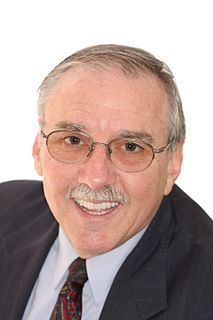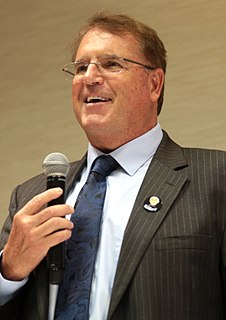A Quote by Milton Friedman
Why have we had such a decline in moral climate? I submit to you that a major factor has been a change in the philosophy which has been dominant, a change from belief in individual responsibility to belief in social responsibility. If you adopt the view that a man is not responsible for his own behavior, that somehow society is responsible, why should he seek to make his behavior good?
Related Quotes
Once infected, the individual [infected with a god virus] cannot detect major contradictions in his beliefs and behavior. Belief systems become self-evident to him, and no amount of logical discourse will move him from his belief. If a Mormon and Catholic were to debate the merits of their respective religions, neither could see his own inconsistencies and logical fallacies, but would see the other's quite clearly.
Do what he will, he [the profane man] is an inheritor. He cannot utterly abolish his past, since he himself is a product of his past. He forms himself by a series of denials and refusals, but he continues to be haunted by the realities that he has refused and denied. To acquire a world of his own, he has desacralized the world in which his ancestors lived; but to do so he has been obliged to adopt an earlier type of behavior, and that behavior is still emotionally present in him, in one form or another, ready to be reactualized in his deepest being.
The provision of health care facilities must be accepted as a social responsibility. It is not that an individual who has the misfortune to be inflicted with some particular disease is solely responsible for searching the facilities to cure his illness. This is a social responsibility which is accepted by governments all over the world. This is part and parcel of the organization of individuals into societies. It is a measure of the degree of civilization.
We are not responsible for the behavior of anyone that goes contrary to what we teach, any more than the Pope of Rome or the Archbishop of Canterbury or a religious leader who teaches moral law and values can be charged with the errant behavior of a parishioner or congregant who may violate their moral teachings. That is on the individual.
In the traditional view, a person is free. He is autonomous in the sense that his behavior is uncaused. He can therefore be held responsible for what he does and justly punished if he offends. That view, together with its associated practices, must be re-examined when a scientific analysis reveals unsuspected controlling relations between behavior and environment.
No civilisation, not even that of ancient Greece, has ever undergone such a continuous and profound process of change as Western Europe has done during the last 900 years. It is impossible to explain this fact in purely economic terms by a materialistic interpretation of history. The principle of change has been a spiritual one and the progress of Western civilisation is intimately related to the dynamic ethos of Western Christianity, which has gradually made Western man conscious of his moral responsibility and his duty to change the world.
Good fortune almost always makes some change in a man's behavior - in his manner of speaking and acting. It is a great weakness to want to bedeck oneself in qualities which are not his own. If he esteemed virtue above all other things, neither the favors of fortune nor the advantages of position would change a man's face or heart.
Friedrich Hayek made the point that one of the keystones of socialism is the denial of individual responsibility. Thus, the crusade for socialism always included attacks on individual responsibility. For if individuals do not have free will, and are not responsible for their actions, then their lives must be controlled somehow - preferably by the state - according to the socialists. They must be regulated, regimented and controlled - for their own good.
In the early 1970s, Milton Friedman argued that corporations should not be socially responsible because they had no mandate to be; they existed to make money, not to be charitable institutions. But in the economy of the 21st century, corporations cannot be socially responsible, if social responsibility is understood to mean sacrificing profits for the sake of some perceived social good. That's because competition has become so much more intense.
Now it is the least developed world who are not responsible for this climate change phenomenon that bore the brunt of climate change consequences so it is morally and politically correct that the developed world who made this climate change be responsible by providing financial support and technological support to these people.
In other words, homosexuality was no longer to be considered an illegal form of debauchery or perversion in which one willingly engaged a person of his own sex, but a mental illness which one blamed on his mother. Consequently, a homosexual is not responsible for his behavior - it's his mother's fault!
Since the social victim has been oppressed by society, he comes to feel that his individual life will be improved more by changes in society than by his own initiative. Without realizing it, he makes society rather than himself the agent of change. The power he finds in his victimization may lead him to collective action against society, but it also encourages passivity within the sphere of his personal life.


































